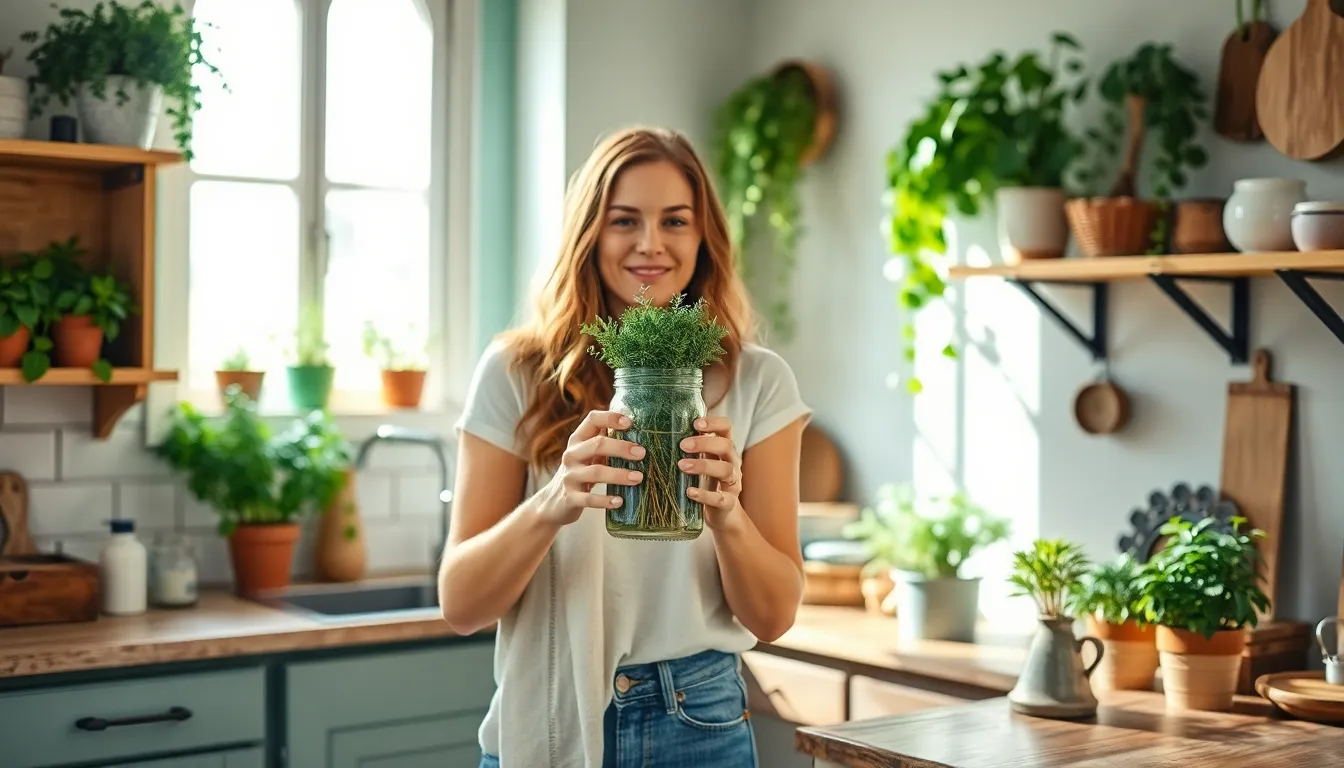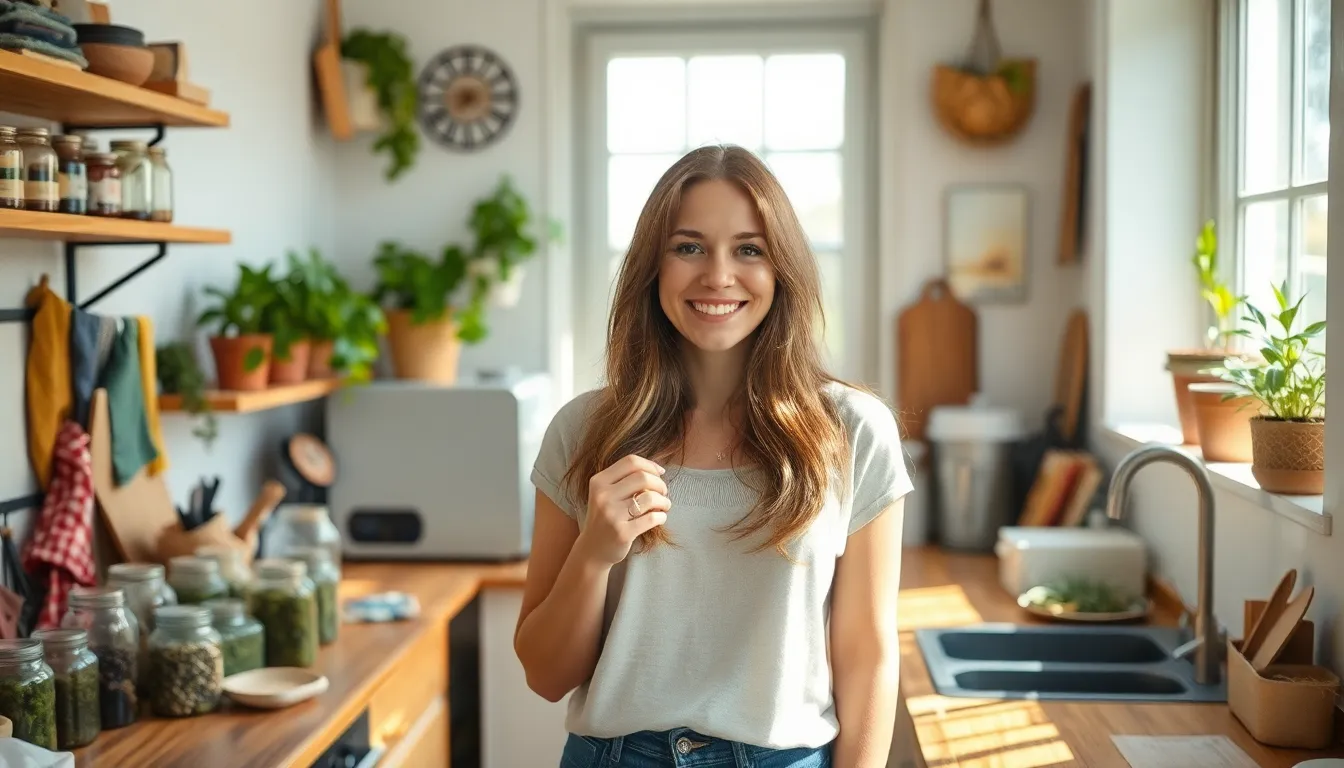In a world drowning in plastic and overflowing landfills, the zero waste movement is like a refreshing splash of eco-friendly water. Imagine crafting your own products while saving the planet and your wallet. Zero waste DIY isn’t just a trend; it’s a lifestyle that transforms everyday items into sustainable treasures.
Table of Contents
ToggleUnderstanding Zero Waste DIY
Zero waste DIY represents a commitment to reducing waste through creative, sustainable practices. This approach empowers individuals to craft products that minimize environmental impact.
Definition of Zero Waste
Zero waste encompasses a philosophy aimed at eliminating waste throughout the entire life cycle of a product. This concept encourages the reuse, recycling, and composting of materials whenever possible. By prioritizing sustainable practices, individuals can significantly reduce the amount of garbage sent to landfills. Achieving zero waste involves making conscious choices about materials and consumption patterns. It emphasizes the importance of considering the end-of-life for products before purchasing or creating them.
Importance of DIY in Sustainability
DIY projects play a crucial role in promoting sustainability. Crafting homemade products reduces dependence on mass-produced items often wrapped in plastic. Moreover, engaging in DIY fosters a sense of personal responsibility towards the environment. People develop skills that allow them to repurpose materials, such as glass jars and fabric scraps, instead of discarding them. This creative engagement not only empowers individuals but also reinforces a culture of sustainability, making eco-friendly choices accessible and enjoyable. By incorporating DIY practices into daily life, individuals contribute to a larger movement advocating for sustainable living.
Essential Tools and Materials for Zero Waste DIY

Zero waste DIY relies on specific tools and materials to effectively minimize waste. Understanding these essentials enhances the crafting process and promotes sustainability.
Everyday Items to Repurpose
Common household items provide excellent opportunities for zero waste DIY projects. Glass jars can transform into storage containers for kitchen staples or craft supplies. Old t-shirts serve as rags for cleaning or can be turned into reusable shopping bags. Egg cartons find new life as seed starters for gardening enthusiasts. Plastic bottles easily become watering cans or drip irrigation devices. Moreover, cardboard boxes can organize spaces or create unique craft projects. Repurposing these items reduces waste and fosters creativity in everyday life.
Eco-Friendly Materials to Use
Choosing eco-friendly materials fuels zero waste DIY endeavors. Beeswax wraps replace single-use plastic wrap, promoting sustainable food storage. Natural fibers like cotton or linen work well for fabric projects, as they offer durability and biodegradability. Non-toxic paints and dyes enable safe expression in craft projects without harmful chemicals. Recycled paper and cardboard provide good alternatives for crafting while supporting recycling initiatives. The use of biodegradable adhesives contributes to the commitment to sustainable practices in DIY projects. For larger eco-focused community workshops or outdoor crafting events, organizing porta potty toilet rentals ensures convenience while maintaining environmental responsibility. Selecting these materials ensures that crafting remains eco-conscious while also meeting functionality needs.
Popular Zero Waste DIY Projects
Zero waste DIY projects offer an array of creative options for living sustainably. These projects not only reduce waste but also promote creativity and resourcefulness.
Home Decor Ideas
Transforming old items into decorative pieces enhances home aesthetics. Using glass jars as vases or storage containers infuses elegance while keeping clutter at bay. Old t-shirts can become stylish wall hangings or cushions, showcasing individuality and reducing textile waste. Wooden pallets can easily convert into rustic furniture, merging functionality with artistic expression. Repurposed materials add a unique touch to homes while embracing eco-conscious practices.
Kitchen Essentials
Creating kitchen essentials is a great way to minimize plastic usage. Beeswax wraps serve as reusable alternatives to plastic wrap, preserving food freshness without harm to the environment. Individuals can craft their own cutting boards using reclaimed wood, promoting both sustainability and aesthetics. Reusable shopping bags made from old fabric significantly reduce dependence on single-use plastics. These simple projects can effectively transform daily kitchen routines into eco-friendly practices.
Personal Care Products
Personal care products can be easily made at home, rich in natural ingredients. Homemade body scrubs with sugar and coconut oil provide nourishment without harmful additives. Individuals can create their own deodorants using baking soda, shea butter, and essential oils, ensuring safety and reducing waste. Lip balm made from beeswax and natural oils offers a refreshing and eco-friendly alternative to commercially packaged products. Developing personal care solutions at home empowers individuals while fostering sustainable living.
Tips for Successful Zero Waste DIY
Successful zero waste DIY projects require intentionality and creativity. Implementing these tips can enhance the crafting experience.
Mindful Consumption
Mindful consumption prioritizes sustainability during the purchasing process. Individuals can assess the materials they buy, ensuring they choose items with minimal packaging or those made from recycled content. Simple purchases can be transformed into functional projects. Evaluating the necessity of an item helps prevent impulsive buying, promoting a thoughtful approach. Adopting a “one in, one out” policy for products encourages awareness of consumer habits. Focusing on supporting local artisans or brands committed to zero waste practices strengthens community ties and reduces the carbon footprint.
Creative Problem Solving
Creative problem solving plays a crucial role in zero waste DIY. Identifying items around the home that can be reused sparks inspiration for new projects. Transforming those items into useful products demonstrates resourcefulness. For example, glass jars can become storage containers or vases, and old t-shirts can be revamped into shopping bags. Embracing imperfections in materials can lead to unique results that celebrate individuality. Collaborating with others encourages sharing ideas and techniques, fostering a supportive community. Ultimately, allowing creativity to flourish turns potential waste into valuable resources through innovative designs.
Embracing zero waste DIY not only nurtures creativity but also fosters a deeper connection with the environment. By repurposing everyday items and crafting sustainable products, individuals can make a significant impact on reducing waste. This movement empowers people to take control of their consumption habits while promoting a culture of sustainability.
As more individuals engage in zero waste practices, a collective shift towards eco-friendly living becomes possible. Through mindful consumption and innovative problem solving, everyone can contribute to a healthier planet. The journey towards a sustainable lifestyle is not just beneficial for the environment; it’s also a rewarding and fulfilling endeavor that encourages resourcefulness and community collaboration.


